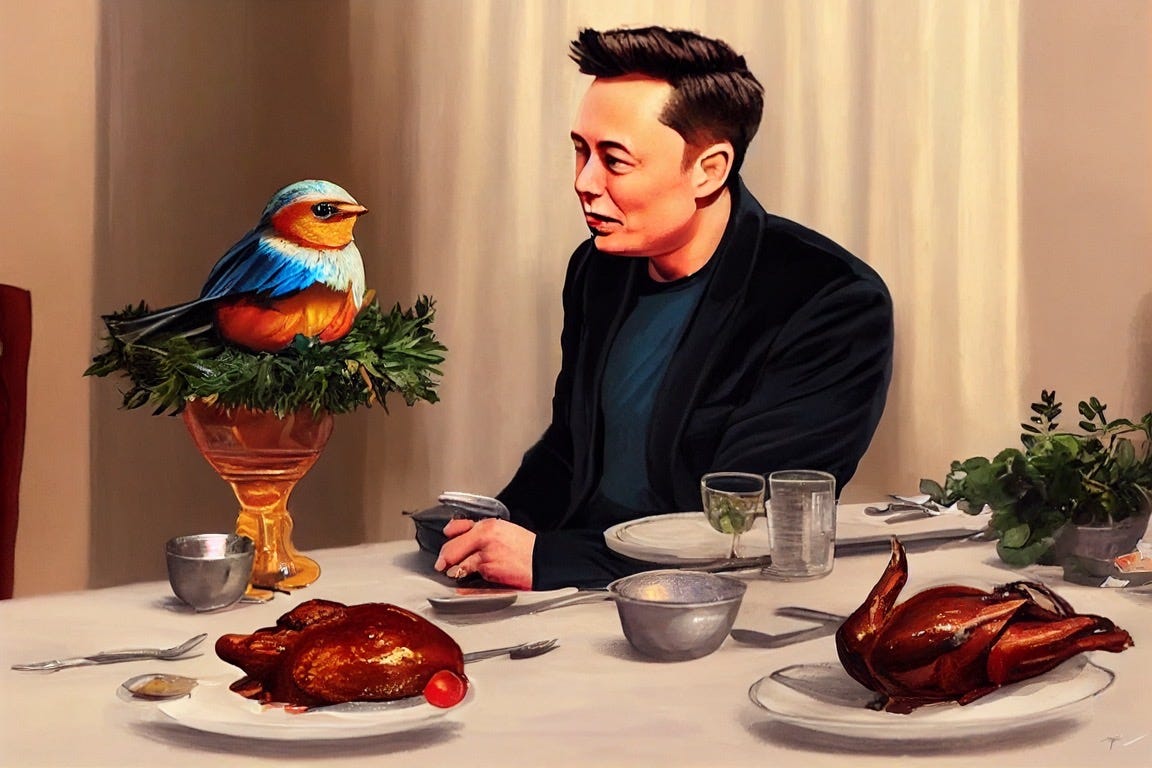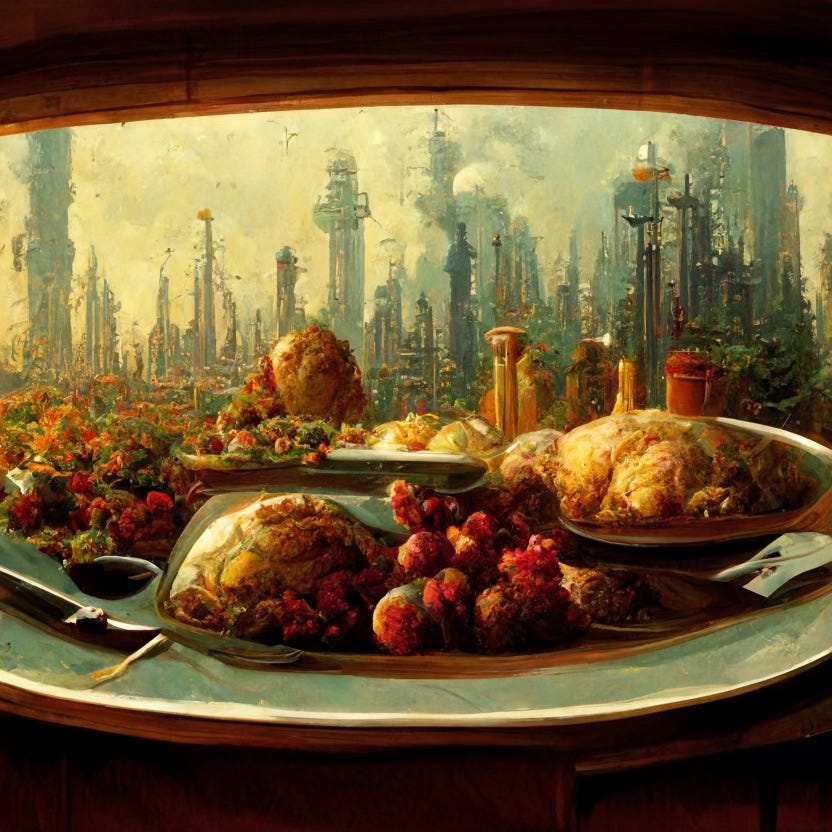Offline Recs: The anything-but-Twitter edition
Lost '80s recordings, Adam Curtis energy, and mysteries set in the world of rare books

Hello pals. We’ve been taking a brief hiatus from publishing new episodes to focus on gearing up for our next season, but we wanted to pop in to say hello. Hello!
You can expect our regular programming to kick off again at the top of the new year. In the meantime, we’re back with another edition of Offline Recs, The Culture Journalist’s monthly digest of books, music, movies, recipes, and other cultural ephemera we can’t stop thinking about — regardless of where they fit in the news cycle.
If we’re being honest, the entire Elon/Twitter debacle, along with about a million other things, is making us want to stay off the internet as much as possible. So in advance of the Thanksgiving break, we’re skipping the list of reading recommendations of the “very online” variety in favor of highlighting some works of culture (and kitchen adventures) that have offered us a bit of solace through the chaos. We also got boyfriend-of-the-pod Drew Millard to contribute a few recommendations. He has a book coming out about golf, which is exactly the sort of offline activity that we’re trying to lean into right now.
Watch
Syzygy, by Jacob Hurwitz-Goodman
Let’s face it: Things have been incredibly bleak this past month, especially if you work in media or tech. Amid the staggering job losses, the 2016 déjà vu, and the inescapable reminders of one man’s extraordinary capacity for recklessness and cruelty, seeing this 30-minute documentary by Jacob Hurwitz-Goodwin pop up in my feed was a reminder that perhaps the best way to keep your sanity intact is to embrace your inner Adam Curtis. And by that, I mean disconnecting from daily who and what of the slow-motion trainwreck that we call modernity, zooming out on the facts of history that led us to this moment, and realizing that those facts add up to something that looks an awful lot like a conspiracy.
Why, despite untold advances in technology, is the story of America’s economy over the past 50 years one of declining wages, of employees being asked to do more with less, of dizzying corporate valuations that seem, increasingly, to be built on nothing but air? The answer, according to this engrossing new film for DIS, lies partly in a shadowy financial mechanism called the leveraged buyout. That’s when somebody purchases a company using debt, then squeezes the company (and usually its employees) to recoup on its investment. Using a strikingly Curtis-like combination of archival footage and voice-over, Hurwitz-Goodwin connects the dots between seemingly unrelated artifacts of American culture (Atari! Chuck E. Cheese! Meta’s 2022 Super Bowl ad! Joe Biden!) to show how the leveraged buyout, and the financialization-of-everything ethos that undergirds it, enabled the economic elite to hijack our economy and suck out all of the value that workers produce. And guess what? It’s exactly the tactic that Elon used to finance his purchase of Twitter. —Emilie Friedlander
The Menu, by Mark Mylod
Between White Lotus season two, Ruben Ostlund’s Triangle of Sadness, and this gem of a black comedy and horror film from frequent Succession director Mark Mylod, the final quarter of 2022 has been a fabulous time for people who enjoy visually sumptuous send-ups of the rich. I’ve decided that people crave this kind of media because it scratches two itches at once: We get to revel in the trappings of unspeakable luxury, while channeling our anger at the class of people who can actually afford to foot the bill. The Menu, however, takes this winning formula and pushes it to a psychedelic extreme. A group of hungry diners—among them a trio of finance bros, a Hollywood actor, a fawning foodie, and an imperious food critic and her editor—pays $1,250 a head to experience an exquisite, multi-course meal hosted on a remote island by celebrity chef Julian Slowik (Ralph Fiennes). Little do they know it, but the megalomaniac Slowik is sick of making food for the elite, and his menu of oyster amuse-bouches and foamed Dungeness crab is set to culminate in the destruction of the restaurant and everyone inside.
Counterbalancing the absurdity of the plot, but also enhancing it, is Mylod’s pitch-perfect recreation of the look and feel of prestige food TV: He hired triple-Michelin-starred Dominic Crenn to help design the menu (well, at least the parts that don’t evolve injuring or emotionally torturing humans), and even got Chef’s Table creator David Gelb to capture some of the food shots. The result is as delectable for the eyes as it is terrifying and revolting—and, ultimately, much more than a commentary on high-end foodie culture. Slowik, at bottom, is an artist who has been driven mad by an inability to reconcile his love for the life-giving act of cooking with a system of patronage that requires him to channel that impulse into creating desirable commodities for other people. Who among us hasn’t experienced that dilemma from time to time? —EF
Listen
Bent By Nature: Deirdre O’Donoghue and the Lost SNAP Archives
Decades before Tiny Desk Concerts were a thing, a little-known Los Angeles DJ named Deirdre O’Donoghue helped define live performance on the radio with her late-night show SNAP on the non-profit KCRW. Hundreds of artists, including Wire, Jonathan Demme, and others who would go on to become some of the biggest names of the 1980s underground, crammed into her basement studio at Santa Monica College for wildly candid conversations and raw, intimate performances. An iconoclast to the bone, Deirdre became a beacon for left-of-the-dial artists spurned by her commercial radio counterparts and the fearless music freaks who tuned in to hear them. You can think of her as an American John Peel, but she never got the recognition she deserved before she passed away in 2001.
This month, KCRW cracked open her extensive archives, restoring and remastering dozens of tape and reel-to-reel sessions that had gone unheard for about 40 years. (Full disclosure, I’m a producer on the project, though it has felt more like a treasure hunt than anything else.) Nearly 100 of them are now up online, with more on the way, including live performances by Nick Cave & The Bad Seeds, R.E.M., Tom Waits, Harry Dean Stanton, Meat Puppets, The Church, and Robyn Hitchcock. Bent By Nature also features an audio documentary about Deirdre and a 24-hour stream of old episodes of SNAP, rife with the dulcet tones of her nocturnal musings. —Andrea Domanick






